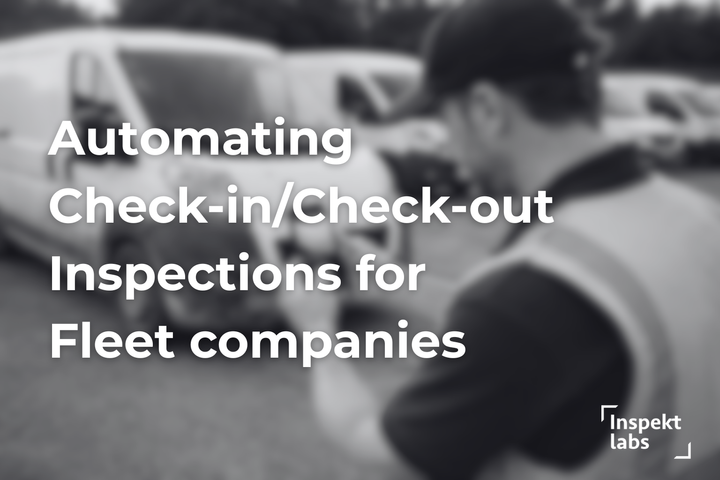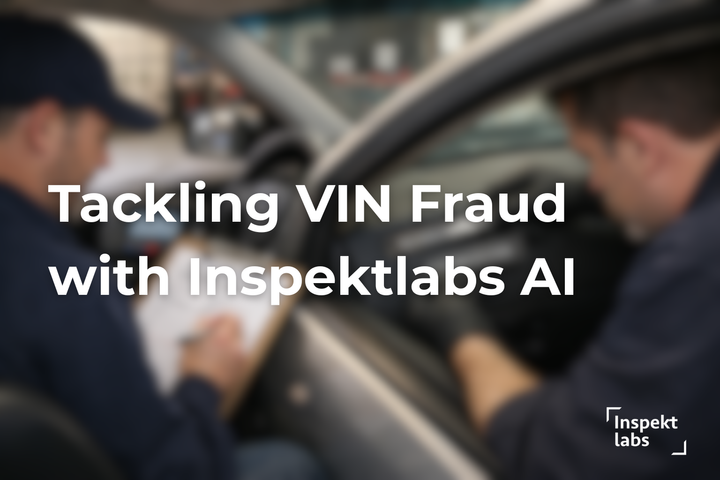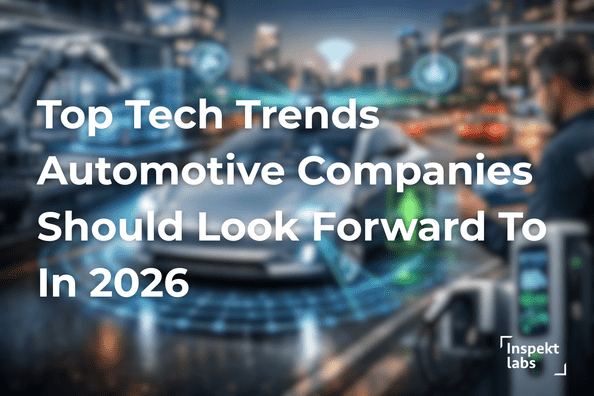The growing market for AI-powered vehicle inspections
The vehicle inspection industry is in the midst of a rapid transformation, and digital transformation is reshaping the way vehicles are evaluated. This blog explores what's fueling the market growth and why businesses are quickly embracing this technology.
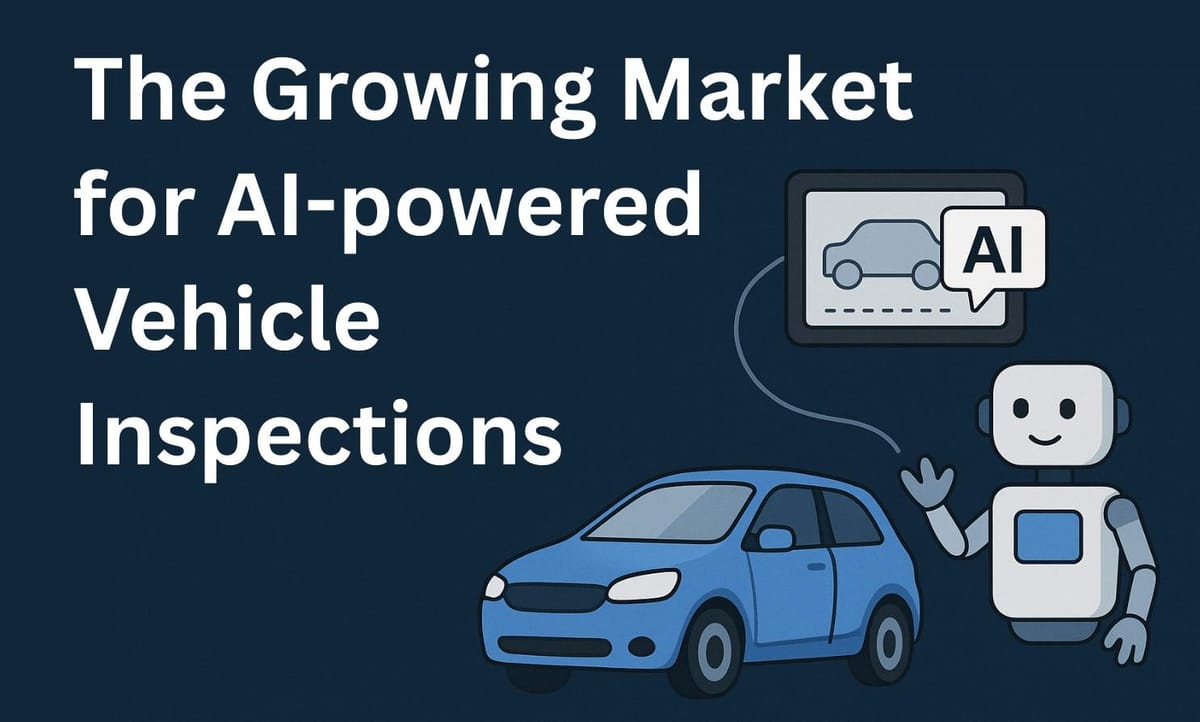
The vehicle inspection industry is in the midst of a rapid transformation. For decades, inspections were done manually, requiring trained experts to physically examine vehicle damage, wear and tear, or mechanical issues.
These traditional inspections are often slow, costly, and prone to human error. In the motor insurance, car rentals, and fleet management industries, where speed and accuracy are of utmost importance, inefficient manual processes directly affect profitability and customer satisfaction.
Today, digital transformation is reshaping the way vehicles are evaluated. Among the most impactful innovations is the AI vehicle inspection, which combines computer vision, machine learning, and automation to deliver faster, more consistent results.
What started as a niche application is now being adopted at scale across industries, from insurers trying to cut down claims fraud to rental companies striving to minimize disputes during vehicle return.
Popular publications like Business Insider predict that the broader AI automotive technology market, which is currently estimated at $4.8 billion, could reach $186.4 billion in the next decade; a clear sign of increasing demand and adoption across industries.
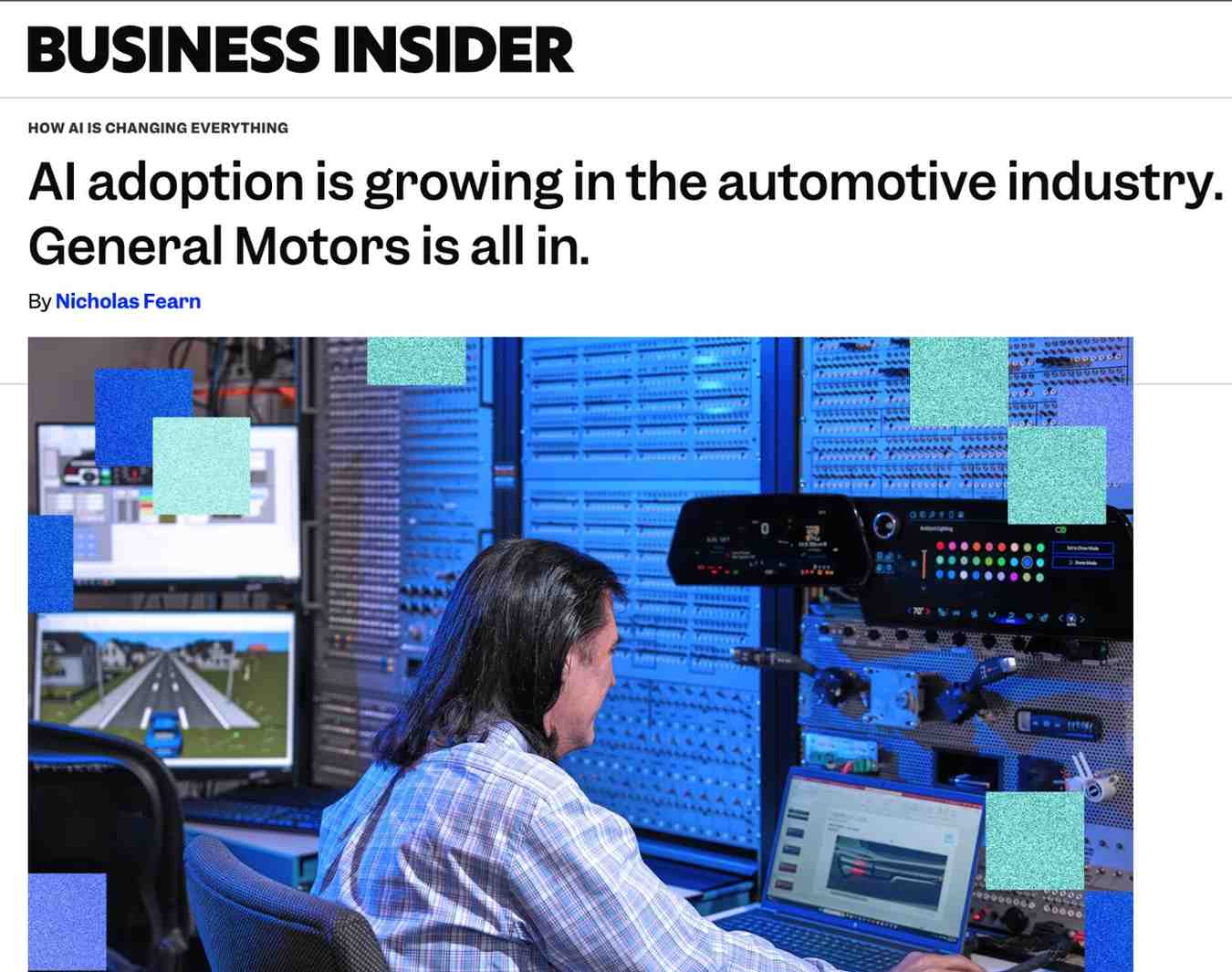
The rise of AI car damage detection reflects a broader industry need: accuracy, transparency, and efficiency in handling high volumes of vehicles. This blog explores what's fueling the market growth and why businesses are quickly embracing this technology.
What are AI-powered vehicle inspections?
At its core, automated vehicle inspections use Artificial Intelligence to check a car's condition through photos and videos. With computer vision and smart algorithms, they are trained to spot issues like dents, scratches, cracks, or even misaligned bumpers quickly and accurately.
Beyond just detection, the technology, which can be used either via mobile apps, fixed camera systems, or hand-held devices, can categorize the damage by severity, location, and type, and outputs a structured report within minutes.
When paired with tools that help streamline inspection workflows, the result is an end-to-end solution that improves speed, consistency, and scalability. Unlike human inspectors who may have subjective judgments or suffer from fatigue, AI car damage detection ensures standardization and objectivity.
Why the market is growing
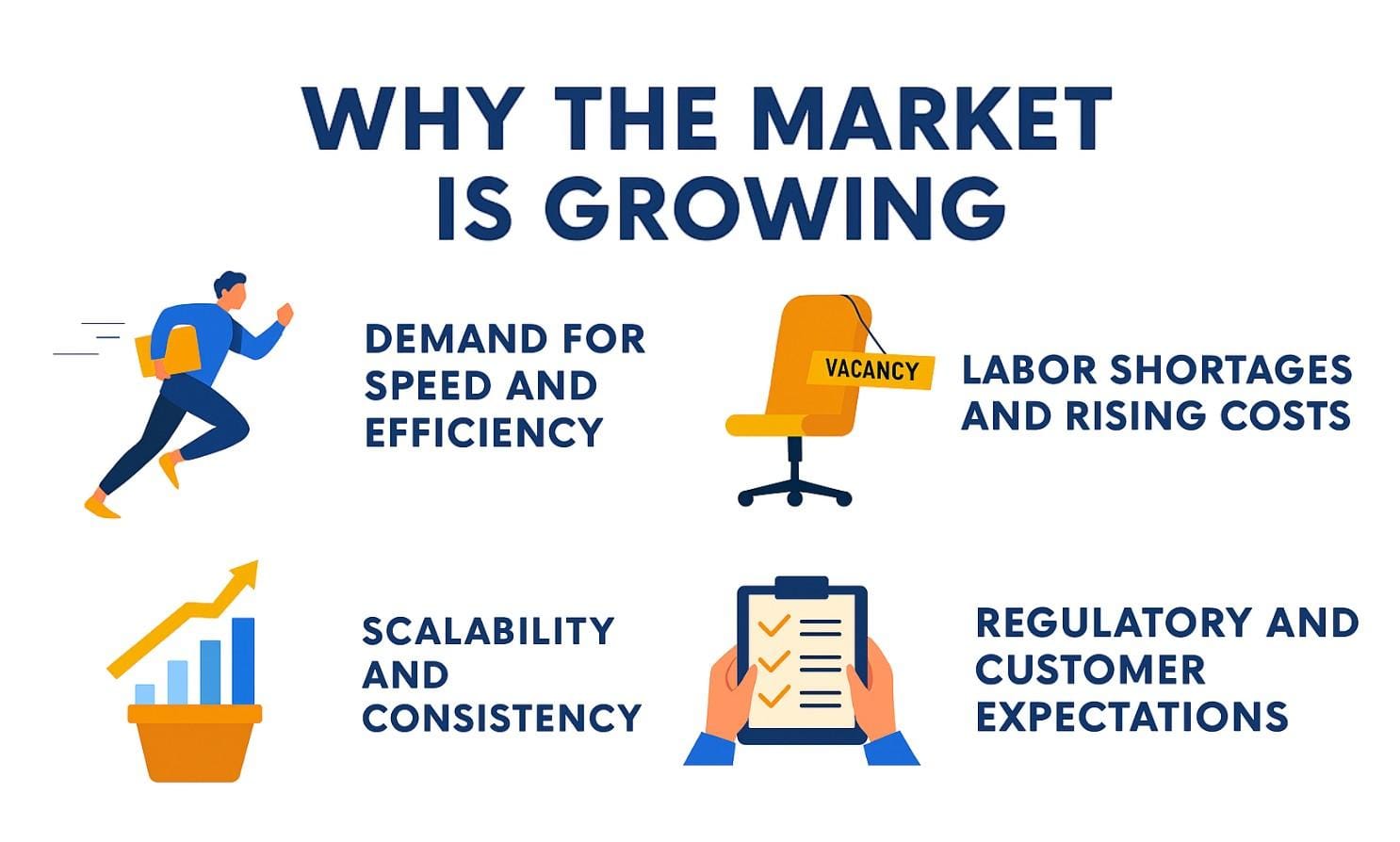
The market for AI vehicle inspections is growing rapidly, with adoption being driven by several critical factors:
- Demand for speed and efficiency: Insurers and rental companies can no longer afford delays in processing claims or handling check-in/check-out inspections. Automated systems ensure results within minutes.
- Labor shortages and rising costs: Skilled human inspectors are expensive, and scaling operations is challenging. AI offers a scalable alternative.
- Scalability and consistency: Unlike humans, AI systems do not tire and can evaluate thousands of vehicles daily with uniform accuracy.
- Regulatory and customer expectations: Governments and customers alike are pushing for standardized, transparent, and auditable vehicle condition reports.
As a result, industries from insurance to mobility are looking at AI not as an optional add-on but as a necessity for survival in the competitive market.
Who's driving this growth?
Multiple industries are leading the adoption of AI vehicle inspections
- Insurance providers - With the help of insurance inspection software, insurers can speed up claims processing, detect fraudulent claims, and improve underwriting accuracy. Instead of waiting for days for manual inspections, claims can now be verified in hours or less.
- Car Rental & leasing companies - Automated rental car inspections ensure consistent check-in and check-out processes, minimizing customer disputes over damages and enabling faster turnaround.
- Used Car Marketplaces and dealerships - Standardized vehicle condition reports enable dealers and platforms to build trust with buyers, reduce disputes, and facilitate fair pricing.
- Fleet Operators & Logistics providers - By adopting fleet inspection tools, managers can proactively monitor vehicle health, reduce downtime, and optimize maintenance schedules.
Each of these industries faces unique challenges, but are united by the need for faster, more reliable, and scalable vehicle inspection solutions.
Technology advancements powering adoption
The surge in adoption is possible because technology has matured significantly
- Improved AI accuracy - Algorithms can now detect both minor and major damage with higher precision.
- Mobile-first deployment - Car inspection tools available via mobile apps make adoption easy for customers and businesses alike.
- Cloud and Edge computing - Faster image processing ensures near real-time reporting.
- Integration capabilities - Seamless integrations with APIs, telematics systems, and repair estimation tools mean businesses can unify inspections with claims and repair workflows.
- Fraud Detection - Advanced AI car damage detection systems can spot reused or manipulated images, helping insurers and rental companies flag suspicious claims instantly.
Key benefits driving adoption
The rapid expansion of AI vehicle inspection isn't just about technology; it's about tangible business outcomes. Some of the top benefits include
- Speed - Inspections that once took hours or days are now completed in minutes
- Cost saving - Businesses reduce reliance on manual labor, prevent fraud, and cut down on unnecessary repair costs.
- Consistency - AI-powered assessments remove the risk of subjectivity and human bias.
- Data Centralization - Digital records are easy to store, retrieve, and audit, ensuring full transparency.
- Scalability - With automation, enterprises can manage thousands of inspections daily without expanding headcount.
For insurers, this results in faster claim cycles and reduced overheads. For rental companies, this causes fewer disputes and increases operational efficiency. For fleet operators, this means maximum uptime and better asset utilization.
Market Outlook
The global adoption of AI vehicle inspections is accelerating. According to a report by Global Market Insights Inc., the market for AI vehicle inspection systems, which was valued at $1.2 billion in 2023, is projected to grow over 18% (compounded annually) over the next decade, and there are clear cues of this happening, coming from across the world.
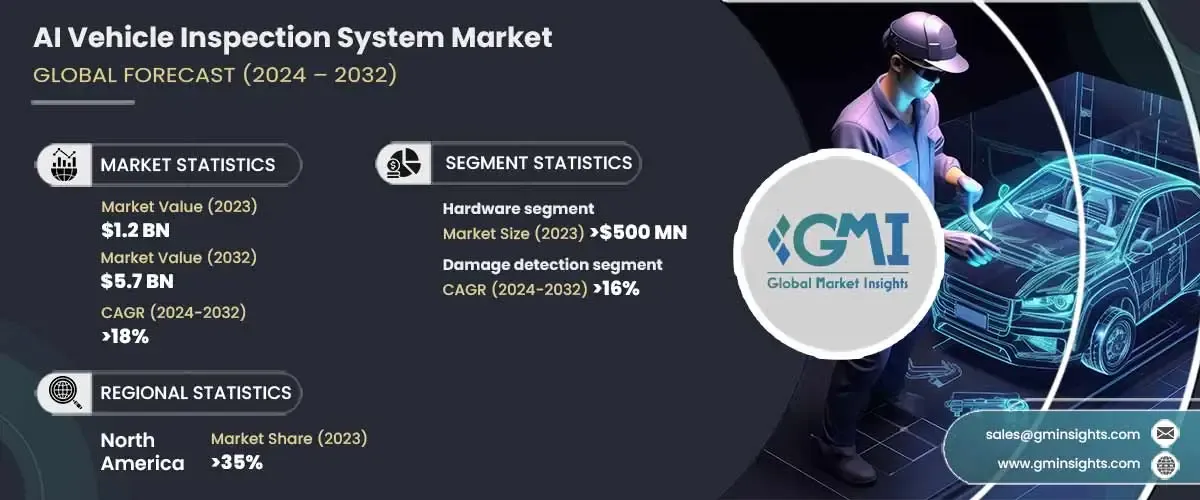
For instance, Insurers in developed economies are investing heavily in insurance inspection software to modernize claim processes. At the same time, rental companies in emerging markets are rolling out mobile-first rental car inspection tools to handle growing demand.
Market analysts project that AI-powered inspections will become a standard part of automotive and insurance infrastructure within the next five years. From dealerships to digital-first car marketplaces, the ability to generate accurate, transparent, and auditable inspection reports will no longer be a competitive edge; it'll be an industry standard.
Challenges and considerations
Despite its benefits, AI inspections are not without challenges -
- Image quality and lighting conditions - Poor lighting or low-resolution images can impact accuracy.
- Privacy and data security - Handling and storing customer vehicle data requires robust compliance frameworks.
- Change management - Traditional businesses usually need proper onboarding and training to get used to these automated systems.
However, with continued investment in car inspection tools and AI training data, these challenges are rapidly being addressed.
Conclusion
The market for AI vehicle inspections is no longer just growing; it's becoming an integral part of the automotive and insurance industries.
With advancements in Ai car damage detection, Insurance inspection software, fleet inspection tools, and car rental inspection solutions, businesses across the ecosystem are reaping the benefits of faster, more accurate, and more transparent inspections.
As the industry moves toward digital-first operations, companies that adopt early will gain significant competitive advantages in operational efficiency, fraud prevention, and customer trust. AI vehicle inspections is not just the future of inspections, it's the new standard.
Interested in transforming your operations with AI-powered inspections? Contact us today to learn more.

